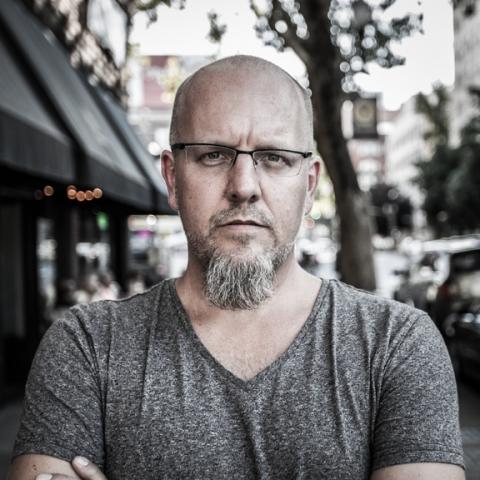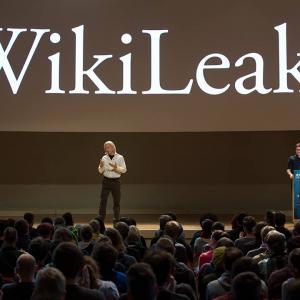
Christian Piatt is an author, blogger at Patheos and founder/cohost of the Homebrewed CultureCast podcast, where he focuses on the intersection of faith and popular culture. His latest book, “Leaving A-holiness Behind,” is available now, and his next book, “Surviving the Bible: A Devotional for the Church Year 2018,” will be available November 1, 2017.
Posts By This Author
Behavior Modification for Social Justice?
The busier life gets, the more corners we cut. One of the first things to go for me is self-care. My wife, Amy, and I both work full time and we have two kids, so it’s fairly easy to get to the end of the day and realize we haven’t exercised, had enough water, eaten a balanced diet or even taken time to stretch. So we recently picked up a pair of these new “fitness bands” that so many people are fans of.
The thing is, they don’t work out for you. They don’t make meals for you or force-feed you water. They really just help you stay aware of your progress in a day, on everything from steps taken to ounces of water taken in and calories consumed. There are even little “rewards” like buzzes and blinking lights when you reach your daily goals. It’s silly, I guess, but when I have it, I do a lot better for myself.
Sometimes we need a little extra incentive to change our behavior for the better. It’s not that we don’t want to exercise or eat well, for the most part; we just get distracted and busy. And when we do, we make small compromises that add up to pretty significant negative effects if we’re not careful.
Five Traits of a False Prophet
Somehow I’ve had the good fortune until recently not to know who Theresa Caputo, (AKA the Long Island Medium) was. The long and short of it, in case you’ve been similarly privileged, is that she has a reality show and claims to speak to dead people. She also has a book, which I saw in the airport bookstore, and tours extensively (including where we are on vacation). Before I knew who she was, just looking at her book cover and the related press around her, I assumed she was the latest in a long string of prosperity gospel preachers.
Not exactly, but kinda.
It got me thinking about what folks like this have in common, be they prosperity-preaching ministers, self-help “Jesus light” media darlings, or channels for the dearly departed from Jersey Shore. Following is a list of traits they all seem to have in common.
Cell Phone Spying: Would Jesus Even Care?
As if it wasn’t chilling enough to learn that NSA cronies are poring over your web browser history, now we discover that Barack Obama sits in bed at night and listens in on German Chancellor Angela Merkel’s cell phone calls to Domino’s.
Okay, maybe those are a bit of a stretch, but quite a buzz has been generated as of late about the revelation that the United States does, indeed, monitor the communications of leaders from allied nations, including the cell phone activity of Chancellor Merkel. For some, the collective reaction has been more of a collective shrug, as if such impositions should be expected from a global superpower that generally prefers to maintain that status. But for others, there’s a clear sense of shock and outrage.
For starters, let's clarify: nations cannot be friends.
Health Care Is a Moral and Religious Issue
The theatrics around the Affordable Care Act seem only to be matched by the public’s ignorance about what it actually is. Case in point: when late-night talk show host Jimmy Kimmel sent a reporter out on the street to ask people their opinions, they felt markedly better about the nuts and bolts of the Affordable Care Act than they did about Obamacare.
Never mind they’re the same thing (sigh).
It seems that a handful of lawmakers have seen to it that our ignorance is sown into full-blown fear, obfuscating the fact that the shutdown – which was largely a fight over the ACA – cost our economy about $25 billion. For those who have been following even on a cursory level, the arguments against the ACA are becoming quite familiar:
· The individual mandate infringes on my freedom not to have insurance.
- The whole thing costs too much.
- It’s a slippery slope to a single-payer system.
On this last point, we can only hope the critics are right, particularly since a single-payer health care system is the only model that has offered hard evidence of both covering everyone and reducing total costs. But since we’re not there yet, let’s consider what we do have with this new law.
'The Fifth Estate:' Is WikiLeaks Good for America?
Am I the only one who finds it deliciously ironic that WikiLeaks founder Julian Assange objects stridently to how he is portrayed in the new movie, The Fifth Estate? The film, which hits theaters in wide release today, turns its attention to the organization best known for publicly sharing otherwise confidential information of various governments, including our own.
Assange is clearly a study in eccentricity. From his tow-headed locks to his lock-down work environment, he fascinates as often as he infuriates. To demonstrate their displeasure about the coming film, WikiLeaks actually leaked the screenplay to the public ahead of the movie release and has published numerous corrections they deem necessary to more accurately reflect history. They have also labeled the movie "irresponsible, counterproductive and harmful,” adjectives made that much more poignant, given that similar epithets have been leveled at WikiLeaks for their own work.
But despite this latest round of drama revolving around WikiLeaks and its lightning rod of a front man, the question still remains:
Is WikiLeaks good for America?
A Strong Third Political Party for the Disaffected Middle?
I was talking to my wife, Amy, today about the news that Speaker John Boehner has requested movement from his party toward a temporary increase of the United States government debt ceiling.
The shutdown in itself is problematic enough. Our leaders have willfully put about a million people out of work while they haggle about policy that has already been put into law. The cost of their standoff to the United States economy is a loss of about $1.6 billion a week in economic output. And it’s more than a little bit ironic that this is being done on the watch of a Congress that supposedly has its first priority as jobs and economic growth.
However, all of this pales in comparison to the potential damage that would ripple throughout the global economy if we were to default on our debt. Because so many markets in the world peg their valuation system to the American dollar, and because so many exchanges use our currency as their monetary system, the prospect of the credibility of our money losing its footing in a potentially irreparable way could be nothing short of catastrophic worldwide.
“We should just fire them all," said Amy. “Just clean house and start fresh.”
The thing is, although this is a sentiment I hear on nearly a daily basis, and I've heard it over the course of many years, very little of substance seems to change when it comes to who represents us in Washington, D.C.
Yes, Community. But Then What? A Conversation with Brian McLaren, Stephanie Spellers, and Doug Pagitt
I can’t count how many times I’ve heard people within mainline Christian churches note that, though they don’t embrace all of the theological positions of their evangelical sisters and brothers, they are impressed by their aptitude for organizing and affecting change on a large scale. At the same time, I see thousands converge at festivals like the Wild Goose festival in North Carolina, feeling both fed by the invigorating sense of community, but also frustrated to be leaving with the still unanswered question:
What do we do now?
The CANA Initiative, which is a joint collaboration of Brian McLaren, Stephanie Spellers, and Doug Pagitt, seeks to help answer that nagging question. Cana seeks to be the connective tissue that helps hold together communities of faith that share common priorities in addressing the pressing socioeconomic issues of our time.
From their website, “The CANA Initiative brings together innovative leaders from all streams of the faith to collaborate in the development of new ways of being Christian ... new ways of doing theology and living biblically, new understandings and practices of mission, new kinds of faith communities, new approaches to worship and spiritual formation, new integrations and conversations and convergences and dreams.”
Following is an audio interview I conducted with these three key voices in the CANA conversation. We talked about why CANA is needed now, more than ever, and what sort of transformation they hope to affect within the greater Christian body.
Replacing Faith with Curiosity
Every day, my previously stable faith is replaced with a little more hungry curiosity. I consider this progress.
I posted this brief statement on my Facebook and Twitter accounts yesterday and promptly received quite a bit of interest in return. Not surprising, really, that my typical readership would resonate with such a claim, but I also found some surprising affirmations from those I would not have expected to appreciate my sentiments.
I write fairly often about moving away from emphasis on a propositional faith and toward one that is more implicitly lived out in our daily experience. Said another way, I would much rather have the teachings and values shared by Jesus revealed through my actions and through what people see in me, rather than simply through any particular rhetoric that I offer them as an act of persuasion, or even coercion. This is also selfishly motivated, as I am increasingly convinced that, whereas a faith centered on the proclamation and defense of particular statements is one that lends itself to inertia, a way of life that reveals your values without explicitly having to state them is both more compelling to others and more fulfilling for ourselves.
Is Immortality Talk Just 'Fear of the Dark?'
Renowned scientist and author of such books as A Brief History of Time, Stephen Hawking suggested recently that it is conceivable in the future that we may be able to upload the contents of the human brain onto a computer so that the information may, in a sense, become immortalized. He readily conceded, however, that such a task was well beyond our current technological capacity, and he offered some measured words of caution for those who sought to read too much into this potential.
When asked if this meant that there was potential for the mind to live forever through an alternative medium, he was dismissive. Such talk of human immortality, he said (and in particular, the very notion of heaven), was the stuff of fairy tales for people “afraid of the dark.”
Then in the same week, TIME Magazine featured a story about Google on its cover, highlighting a new company it has recently launched called Calico. The new enterprise is perhaps the most ambitious of what Google commonly calls their “moonshot” projects, as its aim is to prolong the human lifespan potential, and perhaps eventually solve the “problem” of death.
All of this was particularly interesting to me in the context of the conversation between Richard Dawkins and Jon Stewart on a recent episode of The Daily Show about whether science or religion was more responsible for hastening humanities apparent self-destruction.
Science vs. Religion: A Race to Destruction?
First things first: with all due respect to interim host John Oliver, I for one am thrilled to have Jon Stewart back on The Daily Show. I know it is sad to say, but I actually missed him while he was on summer hiatus. Welcome back, little buddy!
Last night, Stewart interviewed Richard Dawkins, author of The God Delusion, who was promoting his newest title, An Appetite for Wonder. The most interesting moments in the interview revolved around Stewart’s question to Dawkins about whether science or religion ultimately would be responsible for hastening our journey down this path of apparent self-annihilation. What followed was a fascinating, if not entirely satisfying, dialogue about the “downsides” of both disciplines.
Five Things That Are Holding Christianity Back
I’m often asked about what trends I see within Christianity, both good and bad. So in my ongoing effort to help name trends and offer an alternative way of thinking about our faith, here are the five biggest things I’ve seen that tend to keep us from doing our best work as the living, breathing body of Christ in the world today.
1. Church Buildings — Many of our church buildings were established in a time when Christianity was booming numerically in the United States. We could hardly keep up with the growth happening all around us. Understandably, churches popped up where the people were too, drawing many away from their old downtown churches to a more convenient suburban community. But as our numbers have dwindled – combined with the fact the we’re a much more mobile society now that ever before – many churches are becoming monuments to what has long since passed. They have become an albatross rather than an asset.
Talking Sex with a Married Catholic Priest
It’s not every day you meet a practicing priest in the Catholic Church who is married, so when I got in touch with Fr. Dwight Longenecker (a man who meets the above criteria), I took the opportunity to get his take on sex, marriage, celibacy, and how the Church can, should, and already is dealing with sex differently, both within clergy circles and beyond them.
Dwight Longenecker was brought up in an evangelical home and graduated from the stridently anti-Catholic Bob Jones University in Greenville, S.C. While there he became an Anglican and went on to study theology at Oxford University. He married Alison and they have four children. After 10 years as a minister in the Church of England Dwight and his family converted to the Catholic faith. Showing that God has a sense of humor, Dwight returned to Greenville to be ordained as a Catholic priest. He now serves as a parish priest in Greenville.
You are both married and a Catholic Priest. How did that happen?
10 Myths About the Food Stamp Program (That Thing Congress is Trying to Gut)
About a year ago, I wrote about my family participating in the Supplemental Nutrition Assistance Program (SNAP) Challenge, which encourages families to try to live on the equivalent of SNAP assistance (food stamps) for one week. It was a growing experience for all of us, and we actually fell short of our intended goal. It turns out that it’s not easy to feed a family of four well — especially without great time and effort — on less than $20 a day.
In looking back on that experience, a number of myths come to mind that I’ve heard from folks about SNAP, which I thought I’d share here.
Miley Cyrus’ Contribution to Feminism
Ever since the most recent MTV Video Music Awards aired, there has been a breathless competition online to see who can be more offended by Miley Cyrus’ highly sexualized performance. Yes, I watched it, and yes, much of it made me pretty uncomfortable. It was hard for me not to imagine my own daughter a dozen or so years from now, longing to replicate the gyrations and sexual gestures of another – but similarly overt – pop idol.
Basically, it was lowest-common-denominator entertainment: hardly anything new in the music industry. Madonna did as much and then some decades ago, so why is this particular incident such a big deal?
For one thing, one of the most lurid moments of the performance had her grinding in a compromising position with a married man nearly twice her age. Interesting, though, that the criticisms of Miley online have far outweighed those of Robin Thicke, the married man in question who participated in said grinding. Suffice it to say that women historically have been held to different standards of sexual expression than men, and when in doubt, blame the woman. Not that her dance was appropriate, but it tells us more about ourselves when we obsess about the shenanigans of the young woman than the borderline adulterous displays of a much older man.
10 Things Christians Should Say More Often

Photo via Photographee.eu / Shutterstock.com
I had a series a while back about the Christian Cliches that we should drop from our lexicon, and since then I’ve had people ask what they should be saying instead. So here’s a list of handy phrases to help bring followers of Jesus into a post-Christendom, 21st-century world.
Problems with Christian Contemporary Music: An Interview with Trey Pearson of 'Everyday Sunday'
Trey Pearson, front man and creative mind behind the band, Everyday Sunday, is in many ways the picture of a successful Contemporary Christian Music artist. He’s toured the world, played to thousands of fans at a time and sold hundreds of thousands of records. So I was intrigued when I sat down with him at the recent Wild Goose Festival in North Carolina to learn more about why this icon of Christian pop was going solo with his most recent record.
How did you get started in the Contemporary Christian Music (CCM) scene?
I was introduced to the scene as a teenager, finding out that people listened to "Christian music.” I started going to "Christian concerts,” and was inspired to write my own songs and have a band. I was already into performance art as a teenager from doing theater, musicals, acting, and modeling for commercials, print, and things of that nature. I grew up teaching myself piano, and was intrigued by the idea of playing songs for people.
Given my background, I felt like I needed to do "Christian songs" to glorify God with my art. Long story short, after opening for several signed artists, I dropped out of college (after being on honor roll through my freshman year) to make an independent album and pursue a record deal. I went to Nashville, and knocked on doors until someone would listen. I signed a deal three months after I released my independent album.
Diverse But Not Integrated: Religion’s Race Problem
Rev. Dr. Martin Luther King immortalized many phrases still used in the contemporary American lexicon. But it was on Dec. 17, 1963 in a talk at Western Michigan University when he noted that the “most segregated hour in this nation” is 11 a.m. on Sunday.
Though many of King’s other famous quotes come from scripted speeches, the comment above actually was from part of a question-and-answer session with students and faculty about racial integration. He was asked if he believed that true racial integration must be spearheaded by the Christian churches, rather than in workplaces or on college campuses.
Suffice it to say that Dr. King begged to differ, and sadly, his words spoken 50 years ago ring eerily prophetic as we scan the halls of most of our churches. What he claimed then is still, today, a stark reality. He went on in his response:
“I’m sure that if the church had taken a stronger stand all along, we wouldn’t have many of the problems that we have. The first way that the church can repent, the first way that it can move out into the arena of social reform is to remove the yoke of segregation from its own body.”
But how? About the same time King made these keen observations, white people were leaving the inner cities by the millions, establishing more homogenous suburbs on the far boundaries of town. So-called “white flight” took hold, creating entirely new municipalities, while decaying urban centers were hollowed out, left only with an aging infrastructure and those who had no choice but to endure being left to fend for themselves.
As such, our churches were, in some ways, byproducts of the communities in which they found themselves.
There is No Longer Post-Evangelical or Post-Liberal: Talking 'Convergence' Christianity with Eric Elnes
Eric Elnes, author of Phoenix Affirmations: A New Vision for the Future of the Christian Faith and Asphalt Jesus, always has something brewing. I sat down with him over a hearty cup of his own Darkwood Brew coffee at the recent Wild Goose Festival in North Carolina to find out more about Convergence Christianity, a new concept he’s developing, and which is gaining traction across many traditional ideological and theological lines.
Here’s what Eric had to say about the current state of the Christian faith, as well as where he sees it heading.
Why Wild Goose Matters
I just got back a few days ago from a campsite outside of Asheville, N.C., the site of the third annual Wild Goose Festival. For those who are unfamiliar with the event, imagine and old-fashioned days-long outdoor revival, combined with Bonaroo and a traveling circus. For several days, authors, activists, artisans, musicians, and seekers converge to engage in spontaneous community, share ideas and to inspire one another.
It's not every day that you can walk by a makeshift tent and listen to Phyllis Tickle succinctly summarize the history of Christendom in 45 minutes, and then wander over and pick up a vegetarian pita sandwich while on your way to hear the Indigo Girls perform. Impassioned conversations emerge all on your walk about everything from child trafficking to the state of the institutional church in the 21st century. And you're only momentarily distracted by the guy on stilts, wearing a hat covered in goose feathers who wanders by for no apparent reason.
Welcome to Wild Goose.
Vanity of Vanities: Does Ministry Really Matter?
Our church is right in the heart of the city and as such, many who make their home outside find their way into our worship services on Sunday and throughout the week for various reasons. The first year Amy and I were here, we made a concerted effort to allow people to sleep on the steps and in the courtyard of the church if they so chose, as it seemed to be the bare minimum offering of hospitality required of us.
In the past few months, however, things have gotten a lot more complicated. Several fights have broken out over turf, a couple of people have fallen and lost teeth or broken ribs, and at least three times, people have broken into the boiler room to sleep. At least once or twice a week, we catch a group of younger folks shooting up heroin in the courtyard, their needles scattered about in the midst of the greenery. We have found every kind of bodily waste one cares to imagine in the common area, and this Sunday during our annual church cookout, I had to escort one man out of the restroom for masturbating to pornography in one of the bathroom stalls.
There comes a point when the hospitality afforded to those we are trying to welcome in has to be weighed against the safety of those already present in the community. Although the sanitation issues and the vandalism were less than pleasant, the violence, drug use, and sexual indiscretions finally pushed us over the line. We met with the Portland police and had a notice posted that said any loiterers who refused to leave upon request would be arrested.


















